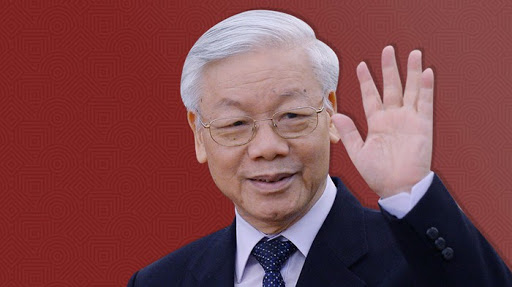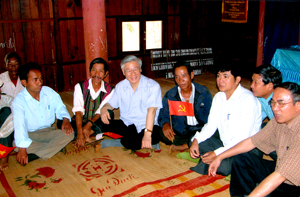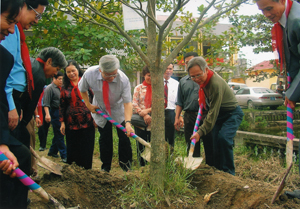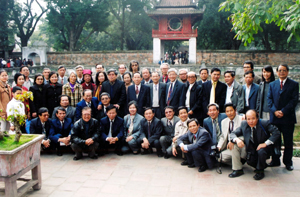
I have heard about Professor Nguyen Phu Trong for a long time, but only recently had the opportunity to meet him. His office at the Hanoi Party Committee headquarters is very simple and plain. As a member of the Politburo, Secretary of the Hanoi Party Committee, Chairman of the Central Theoretical Council, although he is very busy with the preparations for the 10th National Party Congress and many other tasks of the City, he still openly and sincerely received me as if he were someone I had known for a long time. With a warm voice, he discussed the issues I raised one by one, as if they were deep personal stories...
Professor Nguyen Phu Trong was born on April 14, 1944, into a poor farming family in Dong Hoi commune, Dong Anh district, Hanoi. Both parents were farmers, lived honestly, were kind and kept the family tradition. All siblings loved and cared for each other.
In 1947, he evacuated with his family to Thai Nguyen. In 1950, he returned to live in the area, witnessing every day countless scenes of hunger, French invaders searching, surrounding, arresting, and torturing guerrilla and Viet Minh cadres. The village was always nervous and afraid. In 1952, Nguyen Phu Trong began to go to school with the village teacher - a virtuous but strict old teacher. In 1954, after the Dien Bien Phu victory, his homeland was liberated, Nguyen Phu Trong was able to go to school in a peaceful and joyful atmosphere. He studied in the second and third grades in his home commune. When he was in the fourth grade, he had to go to school far away, because there was only one class in each commune. In the bitter cold, he only had a few thin pieces of clothing, went barefoot, and had to burn coal in a butter tube to warm himself along the way. The classroom was a shabby "desert" room in the ancient communal house area. He was a very "bright" student so he was at the top of his class every year.
From 1957 to 1963, he studied at Nguyen Gia Thieu Secondary School and then High School in Gia Lam, Hanoi. The house was far away, separated by the Duong River, so he and his friends had to go to school from 3 to 4 am. Summer was still bearable, but winter was very difficult, many rainy days, the ferry did not take early, he had to go to class late. After a while, he had to stay at a boarding school. A few brothers stayed at a local's house, took care of their own meals and helped each other study. Food was poor and lacking, sometimes he had to study and work to earn a living. Perhaps that was why Nguyen Phu Trong had a sense of independence and the will to rise up early. From a young age, he was very fond of folk literature and often dreamed of pursuing a career in writing or journalism. He was eager to learn and smart, so after finishing 10th grade, he passed the entrance exam to the Faculty of Literature, Hanoi University (1963 - 1967). The school was still scattered at that time. The first year of study was in Chua Lang area, the following year it moved to Me Tri area. From 1965 to 1967, Hanoi University of Science was evacuated to Dai Tu district, Bac Thai province (now Thai Nguyen). That was the period when the resistance war against the US was fierce, but the teachers and students of the school still showed their determination to teach well and study well. Every time he recalls his days of studying at Hanoi University of Science, Professor Nguyen Phu Trong cannot help but feel emotional and proud. He said: "On a beautiful morning in early September 1963, we gathered at lecture hall 1 - Le Thanh Tong street (now area 19 Le Thanh Tong). Before the roll call, I stood playing in Tao Dan garden. Looking up at the school gate, I kept looking at the words "Vietnam University" and felt so elated and proud. When we first met, we were still shy and awkward, but when we got to know each other, we saw that all our friends were "super", not the best or second best students in Literature in the North (at that time the South had not been liberated), but they were all top students in the province...".
In late 1964 - early 1965, in the boiling atmosphere of fighting the Americans, young students competed to write applications in blood to volunteer to go to the South to fight, hurriedly practiced, practiced mock battles, practiced marching, gave warnings, dug trenches, dug tunnels... Some young people in his class went to the South to fight, some "had to stay" to continue studying - preparing their knowledge to serve the cause of building the country. He belonged to the second group. The university gave wings to his dream. He studied Literature - the subject he always loved. He was especially passionate about reading and learning folk poetry, folk tales, poems of Nguyen Du, Tan Da, Nguyen Binh, To Huu... poems imbued with folk spirit. He was an excellent student, a good worker, actively participated in activities of the school, class and Youth Union. In 1967, with the guidance of Prof. Dinh Gia Khanh, a fourth-year student of Nguyen Phu Trong, successfully defended his graduation thesis on the topic: "Folk poetry with poet To Huu" with the only optimal score of that course. In the same year (1967), he was honored to be admitted to the ranks of the Communist Party of Vietnam, a very rare thing for students at that time.

Secretary of the Hanoi Party Committee Nguyen Phu Trong, a former student of Hanoi National University, visited the family that took care of him and the students of Hanoi National University during the period when the school was evacuated in Dai Tu, Thai Nguyen.
The school intended to keep him as a lecturer. He felt very happy and excited to wait. But then reality took a different direction: he was transferred to work at the Study Magazine (now the Communist Magazine) - the theoretical and political organ of the Central Committee of the Communist Party of Vietnam. He was completely surprised and could not help but wonder and worry, but as a party member, he had to obey the organization's assignments.
Nguyen Phu Trong started his career at the Study Magazine by reading, classifying, writing posters, and doing documentation work. He said: "Honestly, in the early days, I felt discouraged because the work was dry and monotonous. I expressed my desire to do research and editing in the field of literature and art, but the leaders replied that no matter what, I had to do documentation, starting with accumulating knowledge. I found it reasonable and tried to get used to the job." From then on, along with doing documentation, he set himself the task of writing articles, starting with small topics. Then his first article was born after years of gestation and incubation (Article "The style of folk songs in To Huu's poetry" published in the Literature Magazine No. 11.1968). With the encouragement and enthusiastic help of colleagues in the magazine, combined with his inquisitiveness and eagerness to learn, he made rapid progress. In 1971, according to the general policy, he was sent by the agency to do a long-term field trip (1 year) to Phu Lam commune, Thanh Oai district, Ha Tay province. He lived in the people's houses, ate with the people, also "sticked with the team, waded in the fields", participated in labor and Party activities as a commune member, a Party member of the commune.
In 1973, he was sent to study Political Economy at the Nguyen Ai Quoc High-Level Party School (now the Ho Chi Minh National Academy of Politics). He was a young student at the Nguyen Ai Quoc High-Level Party School at that time, but he went to school at the time when his father was seriously ill due to a stroke, his wife had just given birth, and he himself had just recovered from a period of stomach bleeding, so he encountered many difficulties. The interesting and useful thing for him at that time was being free from work, focusing on directly studying the classic works of Marxism-Leninism. In particular, he had studied and researched the book "Capital" for nearly a year. That was a very rare and precious opportunity for him to further improve his knowledge, using it as a foundation for his future career.
In 1981, he was sent to the Soviet Union as an intern, to study and defend his doctoral thesis at the Academy of Social Sciences of the Soviet Union (under the Central Committee of the Communist Party of the Soviet Union). He faced a series of new difficulties: new language, new field of study; how to attend lectures, take exams, complete the minimum part on Party Building, and write and defend his doctoral thesis in two years. He was really worried and had no other choice but to "bare his back and take the challenge". In the end, he achieved results worthy of his efforts: passing the minimum part with a perfect score and being the first person in the Faculty to successfully defend his thesis, two months ahead of schedule.

Hanoi Party Secretary Nguyen Phu Trong plants trees at Van Tho High School (Dai Tu, Thai Nguyen)
In August 1983, he returned to the country and continued working at the Party Building Department of the Communist Magazine. He was promoted to Deputy Head of the Department (October 1983), Head of the Department (September 1987), Member of the Editorial Board (March 1989), Deputy Editor-in-Chief (May 1990) and then Editor-in-Chief of the Communist Magazine (August 1991).
He still remembers that when he was in high school, he liked journalism simply because of his feelings, because he felt he could "fly and jump", "go here and there", but later on, through his actual work, he understood journalism more fully and deeply and loved it even more. During nearly 30 years working at the Communist Magazine, Professor Nguyen Phu Trong has experienced many jobs and has written and edited hundreds of theoretical articles in many different genres, from editorials, monographs, commentaries, skits to book introductions, introductions of practical experiences, criticism of wrong and negative manifestations... with all his experience and passion for the profession. He said: "Journalism is a noble profession, but extremely arduous and difficult. Journalists must correctly understand and grasp the functions and tasks of the newspaper they serve and collaborate with. Those who work at a political theory magazine like the Communist Magazine must make great efforts, have high determination, and truly have passion, love for the job, be eager to learn, and especially have a correct working method." Professor Nguyen Phu Trong has been attached to and made many contributions to the process of building and developing the Communist Magazine, especially since he became Deputy Editor-in-Chief and then Editor-in-Chief. The Magazine has had many innovations in both content and form. The articles have become less academic, closely following life issues, and have more information content; many articles have gone deep into practice, serving the Party's guidelines, the State's policies and laws.
In 1992, he was awarded the title of Associate Professor and 10 years later (2002) he was awarded the title of Professor.
In August 1996, Professor Nguyen Phu Trong was appointed by the Central Committee to be Deputy Secretary of the Hanoi Party Committee, concurrently Head of the University Department, in charge of the Party Committee's propaganda work.
In February 1998, he was assigned to the Central Committee to be in charge of the Party's ideological, cultural and scientific work, and Vice Chairman of the Central Theoretical Council. From August 1999, he joined the Politburo Standing Committee; directly directed the compilation of documents for the 9th Party Congress.
In January 2000, he was reassigned to serve as Secretary of the Hanoi Party Committee. Together with the Party Committee and the Standing Committee of the Party Committee, he proposed many correct policies, and led and directed their implementation in a democratic and decisive style, creating clear progressive changes in the capital. In November 2001, the Politburo assigned him to concurrently hold the position of Chairman of the Central Theoretical Council, in charge of the Party's theoretical work. Since the beginning of 2003, he has directly directed the work of summarizing 20 years of innovation, preparing and compiling documents for the 10th Party Congress.
Over the past 20 years, Professor Nguyen Phu Trong has participated in researching, summarizing, and editing many important documents of the Central Committee such as the Party's Platform for National Construction in the Transitional Period to Socialism in 1991, Political Reports of the 7th, 8th, 9th, and 10th Congresses; a number of resolutions of the Central Executive Committee; Resolution of the Mid-Term National Delegates' Conference (7th term), Summary Report on 20 years of Party building work (1975 - 1995); Summary Report on a number of theoretical and practical issues over 20 years of renovation (1986 - 2006)...
He was a member of the Party Central Committee of the 7th, 8th, and 9th terms; a member of the Politburo of the 8th and 9th terms; and a delegate of the 11th National Assembly. And recently, when this book was about to be sent to the printing house, the 10th National Party Congress was successful, and he was again elected as a member of the Party Central Committee and a member of the Politburo of the 10th term.
In the fields of scientific research, theoretical education, and staff training, Professor Nguyen Phu Trong has directly chaired a number of social science research topics and programs at the state and city levels; taught a number of topics for senior leaders, graduate students, and university lecturers; guided a number of graduate students to write and successfully defend their doctoral theses... From 1990 to present, he has published more than 10 books and nearly 30 topics printed in many works. Notably, the books are: "The leadership and activities of the Party in market economic conditions" (1995); "For a national and modern Vietnamese culture" (2002); "Promoting the spirit of Thang Long - Hanoi, building the capital to be increasingly rich, civilized, and modern" (2003); "Party building and rectification - some theoretical and practical issues" (2005)... In particular, the book "The Communist Party of Vietnam in the process of national renewal" published in 2002, reprinted in 2005 and translated into many languages.
When I asked about the connection between the theoretical knowledge of Literature, Economics, Politics, and Party Building he acquired from school and his current practical leadership work, he said: Since working at the Hanoi Party Committee, he has had many opportunities to test theoretical issues in practice. He was extremely fortunate to have received a relatively systematic and methodical training at school. Thanks to studying Philosophy, he has a relatively dialectical and coherent method of cognition and theoretical thinking; thanks to studying Literature, he can express his thoughts more clearly. Knowledge of Economics, Politics, and Party Building helps him a lot in perceiving reality, discovering problems to direct and decide on work. On the contrary, the rich reality of life helps him consolidate and supplement theoretical awareness, see "what is good" and "what is not good" to correct.
During many years of working with the Hanoi Party Committee in many positions, Professor Nguyen Phu Trong has witnessed and made positive contributions to the development of the capital. The orientations and policies that he and the leaders of the Hanoi Party Committee have proposed in recent times have significantly contributed to giving the capital a new look. According to the assessment of delegates at the 14th Hanoi Party Congress, many areas of Hanoi's activities have had positive developments, creating a premise for the city to continue moving forward in the process of industrialization and modernization, towards the 1000th anniversary of Thang Long - Hanoi. At this Congress, Professor Nguyen Phu Trong was re-elected as Secretary of the Hanoi Party Committee for the 2005 - 2010 term with very high confidence.

Professor Nguyen Phu Trong and his fellow students in the Temple of Literature, Imperial Academy
The cadres and people of Hanoi love and trust him because of his intelligence, style, working spirit, humility and flexibility in handling his work. Many people have sent letters expressing their feelings and trust in the leadership of the Party, including him personally. Those who work with or have been close to Professor Nguyen Phu Trong said that he lives a very simple, sincere, respectful and close life to his brothers and colleagues, is close to reality and always listens to the opinions of the masses. He seems to have no time to rest. On Saturdays and Sundays, he "relaxes" by going to the grassroots, meeting with the people, conducting field surveys or visiting friends. The press has told many stories about his trips to the locality to learn, inspect and solve difficult problems, such as: Thanh Nhan "slum" area, Soc Son waste treatment area, Bus Transport Company... visits to nursing homes, drug rehabilitation centers, social protection centers, families in difficult circumstances... He is a person who is conscious of preserving qualities and ethics, not taking advantage of his position to take care of personal and family privacy. Going to work, he often eats lunch in the office's collective kitchen with his colleagues; at class reunions to meet old friends, he still uses "you" and "I" as enthusiastically as when he was a student. He often says: "Each person has a different destiny, today we do this, tomorrow we can do something else, living together is about meaning and affection". He also confided: "I know there are many things I have not done, many plans have not been completed, there are still many shortcomings in my work; in the position of a leader, I absolutely cannot be subjective; on the contrary, I must try and make every effort to be able to complete the task."
Nguyen Phu Trong - a student at Hanoi University of Science in the past is now a member of the Politburo, Secretary of the Hanoi Party Committee, Chairman of the Central Theoretical Council. It has been a long journey of striving, constantly learning and practicing to rise up. In 2000, Ms. Dang Thi Phuc - a teacher who taught Professor Nguyen Phu Trong 50 years ago, when he was in 4th grade - with all her affection, wrote him a poem with the following passage:
"Who would have thought that the little game from years ago
Now a senior official helping people
Looking at you is like looking at fresh flowers
"Worth the care from childhood"
(The little student of the past)
That is the happiness of the "ferryman" like teacher Dang Thi Phuc and also the happiness of the "crossing the river" student who is working day and night, devotedly contributing his strength to the country and his homeland like Professor Nguyen Phu Trong!
Author:Luu Mai Anh [100 Years - Vietnam National University, Hanoi]
Newer news
Older news